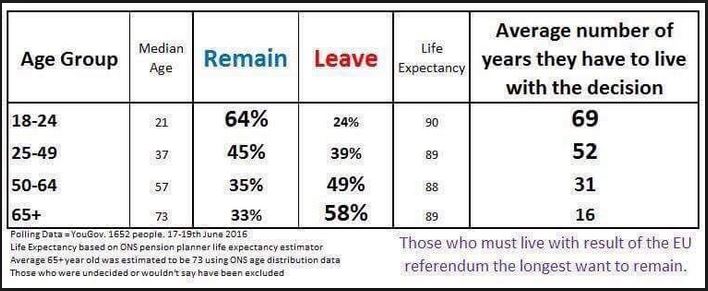Youth and Brexit
The Youth and Brexit website is now live and can be accessed at: https://youthandbrexit.co.uk/
Being Young in a Brexiting Britain: Why it matters
We know that Remain support was high among 18-35 year olds who voted, but the turnout of that group was very low, and systematically low turnout and disaffection with politics has been a feature of recent British elections. Even if opinion among this generation is more divided than the poll results suggest, we know that they face and will continue to face a range of problems that the working out of Brexit may exacerbate – paying for their education, getting on the housing market, carrying an aging population, and supporting a health and social care system in the country that is at crisis point in many parts of the United Kingdom, while facing much less secure economic prospects and a more unstable international climate than did their predecessors. Young people also make up the main body of European migrants to Britain and of longer distance migrants attempting to get into the Europe. And the future status of students from Europe and more globally and of those who have moved to Britain over the last 10-20 years is now unclear. One possible result of a ‘hard Brexit’ is an economic slump that will fuel a cocktail of disempowerment, dissatisfaction, and increasing conflict within and between generations. That conflict will be exacerbated as the proportion of the ageing in the population increases and upcoming generations are asked to carry more and more of the burden of supporting their predecessors.
These are just some of the issues that face this country in the negotiations over Brexit and in the deals that are made. It is our view that these are matters that need to be addressed with this generation. Warwick has extensive academic expertise in History, Politics, Sociology, and more widely but, while academic work can inform discussion, responding to the issues and thinking through the possibilities is something that must be developed collaboratively with this generation. After all, it is their experience and their futures that matter and they might rightly feel that they have had enough of the post-war boomers putting their own interests first.
Meeting 15.00-16.00, 9th October 2017 in: The Oculus, OC1.04.
Student Laboratory on Brexit, Youth and Politics
The History Department’s European History Research Centre, with members of the Department of Sociology, PAIS, the Schools of Law and of Modern Languages, and the Centre for Interdisciplinary Methodologies, has developed a project to bring together students within the University to reflect upon the result of the referendum on European membership and the Brexit process, and to consider the involvement of young people in subsequent events. Drawing on students from across departments in the arts and social sciences faculties we have created a forum for research and discussion to help articulate the voices of young people on the causes of Brexit, the rhetoric of the campaigns, the options before the country, the likely impact on the younger generation, and the wider involvement of young people in the political process.
This ‘student laboratory’ engaged a group of Warwick students over the summer to work on an independent research project on various aspects of Brexiting Britain, and these will contribute to a series of blogs that will be published in late October and will then be expanded throughout the year.
A meeting for student interested in contributing to the development of the website as a site for research and commentary will be held in Monday October 9th - between 3 and 4, in OC1.04. All students are welcome.
Project leaders are Ian Caistor-Parker and Isabelle Riepe and can be reached through the link below or via e-mail at I.Caistor-Parker@warwick.ac.uk and I.Riepe@warwick.ac.uk
To register an interest, you can go to the registration page.
See https://www.theguardian.com/uk-news/video/2016/jun/24/what-do-young-people-think-about-brexit-video


